Anatomy of an Era: Eric Stokes, Part 2
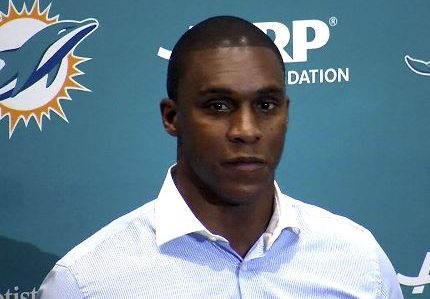
Excerpted from Chapter 66, No Place Like Nebraska: Anatomy of an Era, Vol. 2 by Paul Koch
Anatomy of an Era: Eric Stokes, Part 2
Q: What about any of the other defensive coaches? Anyone else in particular stand out to you as far as the staff dynamic from those days?
Eric Stokes: Of course, Charlie McBride stands out. Charlie was really kind of interesting. Coach McBride never actually really said that much to me. My whole career I really never had much of any conversation with Charlie McBride, then my senior year -I was having a good senior year- we had the loss at Arizona State and I had probably one of the better games in my career: had a bunch of tackles, double digits, 13-15 pancakes. And he gave me a lot of praise in the media, but he still never really spoke to me, never talked to me.
And then one day we were going to a game -I don’t even remember the game- and we were getting on the bus and I took my seat on the bus. (I always kind of had my one spot, I always kind of sat toward the front of the bus) And he sat down next to me and we started talking. And one of the things he said was, “You know, you have a really good chance of playing in the NFL, right? What do you think about that?” And I thought, ‘Wow,’ because at the time I hadn’t. It was one of those things at the time that I just kind of kept inside myself, didn’t want to put that out there. That’s not my nature or my way. I set goals and I keep them inside, I don’t want to advertise them like, ‘I want to play in the NFL.’ That’s never been my way. So I was pretty surprised that he said that, and then he basically went on to talk about the nice season I was having.
And then we go on to the senior banquet and he had some really nice things to say about me and was really emotional about it. It really caught me by surprise and we have bonded since. It was an interesting time.
Q: Do you think it was the case of his having a strong belief in you that he maybe didn’t feel a need to ride you? Maybe spend more time with some other guys and bring them up to speed?
ES: Maybe that might have been it. Everybody wanted, deep down inside, everyone wanted to be a ‘Charlie McBride guy.’ That meant you were something. That was a hard circle to get into. And so it may have been the case, I don’t know. That day on the bus, I don’t know what brought that on. I was always just the guy that came to work.
And my experience at Nebraska was different. It wasn’t all roses. As a matter of fact, I went to Nebraska thinking of it as a dream situation, but it really was kind of a rough road. I was hurt early on in my career. My sophomore year I was diagnosed with a benign tumor and I thought my career was going to be over, and I came back from that and didn’t miss any games and actually ended up winning the starting job at corner coming off of my sophomore year.

Available on Amazon.com
And then I get benched four games into that year by Michael Booker, which was a tough case because it was hard to take. But then Michael Booker ended up being a top draft pick, a top 15 pick. But at the time it was pretty devastating to have that happen. (laughs) Then I was kind of a backup who kind of had to earn his way back into it, and I still played quite a bit that junior year, and then I went into my senior season as a starter and started every game.
But it wasn’t all roses, and it definitely wasn’t the easiest road. And I’m not the only guy who went through that. I’m sure other guys went through adversity as well, I’m not trying to say that. You have this image and you live in Lincoln and you watch Nebraska football and you kind of have this picture of everything of what your experience is going to be about, but it challenged me for the better. Definitely for the better.
Q: And let me ask you: all these other guys coming from far-flung areas like Texas, California, & Florida, would it seem like many of these guys needed to be brought up to speed as to what Nebraska football was about? What it meant to people?
ES: No. I remember Mike Minter was from Oklahoma and he lived and died, legitimately loved Nebraska football. The guys who came to Nebraska already had a sense of what it was all about.
And I think it’s funny: the guys who already didn’t have a sense of it? They didn’t make it. There were some guys in my class, if you just didn’t embrace the situation and didn’t toe the line and you didn’t work and didn’t take care of your business, you weren’t going to make it here. There was a standard that was set and everyone had to toe it. Everyone had a role in how they did it, so I think that’s what I take out of that experience, reflecting back.
Q: And that standard, that expectation of effort, do you think it carried all the way through the hierarchy to Coach Osborne, from the top down?
ES: Yeah, I definitely think so. I just think Coach was… you just didn’t want to let him down. You just didn’t want to let the guy down, and I think that’s why everyone always gave their best.
Even on the defensive side of the ball, I would say the feeling was just the same for Coach McBride. And I’m only talking from a defensive perspective, but Coach McBride gave some of the best –not that we needed motivation- but he gave the best motivational speeches you’ll never hear. McBride was all about playing for your teammates, playing for your family, you’re playing for yourself. He preached all the things. But it wasn’t about you. You were representing a lot of people when you stepped out there, so all those things played a factor in it.
Q: He played upon your personal honor as an ambassador of where you came from, who you represented?
ES: I just think it was really having pride in what you do, to sum it up in a few words, “Just be proud of what you do.” That was the message that was distilled.
Q: Do you think that had anything to do with a Midwestern work ethic?
ES: I would say exactly that. But Coach McBride too, as a coach, he was a blue-collar guy. He was a roll-up-your-sleeves personality, anyway. And then from Coach Osborne’s standpoint, I just think he had a way of conveying a message of winning, but doing it in a way where you were all coming together and doing it, “No one person is bigger than this.” And of course, Coach always had to put a spin on it and keep things in perspective, because winning truly wasn’t everything for him, it truly wasn’t. I really think it was more about the players. As corny as this may sound, he kind of always preached the message of giving it your best. (laughs)
Q: To borrow a phrase from former 49er Coach Bill Walsh, “The score takes care of itself”?
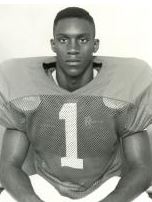
ES: Yeah, although he never ever said that, but we had that. We had the talent, we had the players… I don’t think a lot of college teams in the eleven years I’ve been scouting, I haven’t seen any teams with more talent than what we had. I really can honestly say that.
It was funny, I had a debate with a guy up at work who was with USC when they had their defense and those ’backers all got drafted. And even like the Reggie Bush era and the Matt Leinerts, they couldn’t, they wouldn’t be able to beat us. On a neutral field, neutral site, 8 p.m., you pick the spot, no one could beat us. I really believe that from top to bottom. No one could have beaten us. There’s no way. In my heart I truly believe that.
I’ve seen that team, and talent for talent, player for player, you can pick any of those USC teams from that era, throw in that Vince Young 2005-2006 Texas team, on a neutral site? There’s no way. I actually think Vince Young would have given us a hard time because he was a scrambling quarterback. They gave us trouble.
Q: And what about Coach Osborne? Any special conversations stand out in your memory?
ES: You know what, no. My two experiences with Coach, the most lengthy one was him offering my scholarship and coming to my house and meeting with him.
I’ll never forget the football camp: I was warming up and they asked about 4 or 5 of us to go meet with Coach Osborne and I’m thinking, ‘This is great.’ And you walk into this huge office and coach is there, and I’ll never forget him giving me my talk about wanting to offer me a scholarship right there on the spot. I couldn’t believe it. So that will forever stick in my head, because I can remember him so vividly sitting there and me sitting across from him in that chair.
And actually, it is so funny, because Coach really dominated the offensive side of the ball, but there is kind of an interesting story: I remember one time I got on the elevator with him and I was on with a couple of walk-ons -and to this day I don’t even know their names. I didn’t know their names then- but to point out Coach Osborne and the kind of person he was? He gets on the elevator and he says hello to the two walk-on guys. And he says their names and then he says, “Hey, I saw so-and-so, and your team won last weekend.” And this is some walk-on from one of the smallest level schools that you can think of. He’d said the name of this high school, and I didn’t even know of the high school! (laughs) But he was a Nebraska kid and he knew the score and he knew the kid’s name… and that’s Coach.
It wasn’t always all about the stars and the Tommie Fraziers and Ahman (Greens). He truly knew and cared about every single one of the players on that roster from top to bottom, and I thought that was really unique.
Q: Do you think that was a major part of guys not wanting to let him down?
ES: Absolutely. And I thought there was always competition. Always competition. If it came from the scout team, I mean, those guys gave it their all. It was competitive. It got heated sometimes. (laughs) They would score on us or make a play, and it was heated. But that’s a big part of why we were successful, though.
From top to bottom there wasn’t any one aspect of those teams where there was a weak link. You were getting it all the time. And if I was pushing Tony Veland, then Eric Warfield was pushing me, and Mike Minter was pushing Toby Wright and John Reece. So there was always a team, but there was always competition. There was always competition. That really, truly drives you to excel.
Q: That reminds me of Matt Turman and talking about his time on the scout team, where if you had success you were gonna hear Charlie shout those words, “Run it again!” He said those three little words were ‘the bane of his existence’, because he knew he was going to get absolutely slaughtered on the next play…
ES: That was the thing about it, too. Those guys, you know? Turman paid his dues just like everybody else. Exactly right. You knew the play and they ran literally the exact same play, (laughs) so, “Bam!”, car wreck. Guys would get heated.
Q: Biff Roberts talked about him and Damon Benning always getting into fights…
ES: Oh yeah. Well now, because Biff Roberts was like 6 foot and 170 lbs., just a stick. But he was tough! And Biff would come up and try to lay the wood on guys… and he won some battles and he lost some battles. He always brought it. That was for sure, he always brought it. I can remember him. He was a walk-on and I know him and remember him just for that reason. He was a guy that wasn’t as athletic. You could make a case that he didn’t belong out there, but he would give it 110%. (laughs)
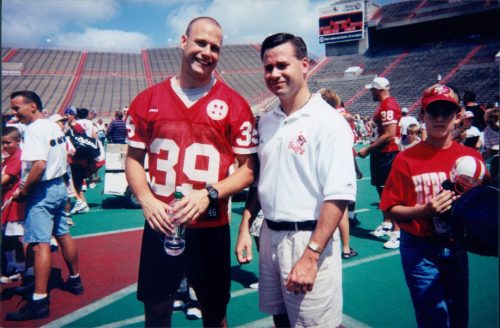
Autograph Day ’94
Q: And bringing up Booker, I didn’t realize that he and Lawrence Phillips did not get along… at all.
ES: They did not. As a matter of fact, did Booker tell you about the little squabble they got into? (laughs) I remember, I was there. It was funny, because I didn’t know Booker very well at the time, because he was a Prop 48 that year and he was sitting out, so he really wasn’t officially on the team, per se, but those two got into it one day. So I don’t know to this day why there was no love lost, but those two definitely didn’t get along. Two California guys not that far away from each other -West Covina and Oceanside- not being that far from each other, but they didn’t get along. They did not hit it off well at all. (laughs) And then it got to the point where they just stayed away from each other. They did not travel in the same circles. And, of course, Booker probably didn’t mention this, but we’re both fraternity brothers on top of that. But I know for a fact that those two did not see eye to eye on any level. (laughing)
Q: What fraternity was that, Eric?
ES: Kappa Alpha Psi.
Q: Was that the guys who used to get an omega branded on the arm with a cattle brand?
ES: Yeah, I actually have two. One on both arms, on the biceps.
Q: Eric, when I was an unpaid student volunteer student assistant, before I got full-time and joined the staff, (this was way before you even joined on, I think we still had Marvin Sanders, Lawrence Pete, Jon Crippen playing, maybe…
ES: Now Lawrence Pete, he was a member of a rival fraternity. He was a member of a fraternity called Omega Phi Psi, called a ‘Q’.
Q: The Q-dogs?
ES: Exactly.
Q: Well, those guys supposedly were thinking about asking me to join their fraternity, which is a primarily black fraternity, right? (laughs)
ES: (laughs) Yeah, it’s a black fraternity. I don’t know if that adequately describes it. You would have been probably one in a million. (laughs) Though, as a matter of fact, there was one Caucasian guy who did pledge at UCLA, but to my knowledge, to this day I think he was one of a few white guys to ever pledge a black fraternity. So you would have been going into uncharted water. (laughs) I don’t know how you would have come out of that.
Q: They had a very brutal hazing routine, if I recall?
Eric: Uh, yeah. Very, very. It was definitely a rite of passage, I can attest to that. I don’t know if you would have come out of it standing. That’s hard to say. (laughs)
Q: So let me ask you, do you remember the first game you played in?
ES: As a matter of fact, I do, because we played North Texas State, I think, and I had an interception my first game at Nebraska as a redshirt freshman. That stands out, first game I ever played in. And it was an interesting game because the first play they threw at me the guy caught like a 20 yard fade route on me and I thought, ‘Dang, that’s not how I wanted my first play at Nebraska to be.’ The second pass they threw at me and I intercepted it, so that’s how that happened.
Q: You were a quick learner, huh?
ES: Very vivid memory, yes.
Q: Any favorite practice stories come to mind?
ES: (laughs) You know what, you kind of caught me off guard, because there isn’t one that just completely stands out right now. And to be quite truthful, I tell you what, our doggone practices were pretty darn businesslike and you had Charlie going and there were some things that you probably don’t want to put on record that were all giggles -but I tell you what, when you had Charlie and Kevin Steele and Darlington and all those guys going, there wasn’t much room for relaxing and messing around.
I don’t know what other guys had to say. I think a lot of the jokes, truth be told, came from the defensive line. When you’re dealing with Charlie McBride, I can only imagine. You know, we had a nickname, we called the D-linemen ‘The Crazies’ when we had Wistrom and the Peter brothers and those guys. I remember McBride talking before we were getting ready to play, and basically his message was like this: “We’re gonna set ‘The Crazies’ on them, and then the defensive backs will essentially just cover and do their job.” (laughs) It was true, it was just that blunt, “We’ll set them loose and you guys cover them and end of story.”
When you had Wistrom and the two Peter brothers and Jared Tomich? I have no idea what was going on with those four guys, they were out there. And not to mention, when I first got there we had John Parrella and Kevin Ramaekers. You had some clowns, now. They were birds on a wire. They were walking a fine line sometimes with those guys. (laughs) I don’t know as many jokes coming out of the back end, but I can’t think of too many situations when we were really allowed or had the situation where we could cut loose and laugh.
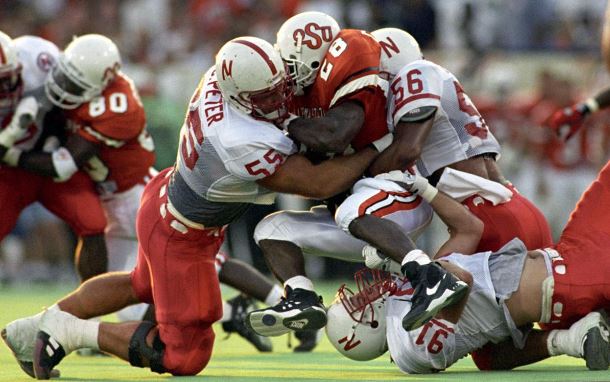
The Crazies do their work
Q: Not as loose a group as the receivers, huh?
ES: No, not at all. And George didn’t have that type of personality. He wasn’t that way. Coach McBride, he was always going between the dip and the gum and taking his teeth out and him barking at you, he would just do some crazy stuff, literally kicking these defensive linemen in the behinds. Charlie was blunt.
And it’s funny now, but it wasn’t funny then. That’s why I’m really having a hard time remembering. Take the NFL scouts: if you were messing up in practice he’d say, “Hey, I’m gonna tell the NFL scouts that you’re dumb as a tick and you can’t learn. And you mark my word, I’ll tell ’em that!“ That was serious stuff. And you can laugh now, but believe me, those guys weren’t laughing then. It was serious business, man. Serious business. (laughing)
Q: Any memorable off-field occasions?
ES: Well, like I said, we’re really just talking about that D-line group. Even in that locker room, I don’t know what some of those guys have said, those are probably all somewhat censored discussions. Some of the things they did in that locker room and some of that hazing? The D-line, you had to go through a rite of passage with the D-linemen. It just went down from player to player to player.
And one thing about being a young guy was getting into the varsity locker room. I remember all of us, that was the biggest thing I remember, being told I was gonna get to go into the varsity locker room and have a locker there and was excited, but we’d also heard all kinds of horror stories of what was going to happen once we got in there. (laughs) Everyone was like, “I don’t know about this. What’s gonna happen? What are they gonna do to me?” Those were the type of things that just went on behind the scenes.
And sometimes it costed us, but for better or worse some guys played hard off the field, too, in some cases. It was just the nature of the team and might have gotten some guys in trouble, but that was the nature of the team. I don’t want to say we were like the Raiders, but there were just enough renegades, edgy personalities, that made the whole thing unique, made it just kind of tick and come together, you know? And you’d see some things, like with Michael Booker and Lawrence Phillips; I can’t say that this was a team that we were just all the best buddies. I wouldn’t describe the locker room like that at all, but when we stepped on that field there was one common purpose and one common goal, and that was all that mattered. You didn’t have to be buddy-buddy with everybody on the team, but the sense of focus and sense of purpose and a single-minded goal, especially when we were driving for those two national championship seasons after we came up short against Florida State.
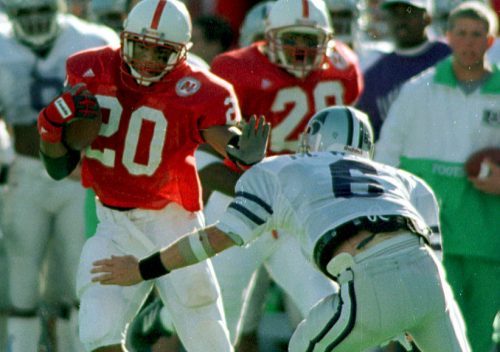
After losing that game the whole dynamic, the whole mindset changed. It completely changed, because I can even remember as a redshirt freshman thinking, “Some of the guys aren’t into ball. Their focus isn’t where it should be.” And literally, if you were to talk to guys in my class and the Minters, the Grant Wistroms, and you saw how they changed after that year. There was a true commitment, and even from the coaches’ standpoint.
For Coach Osborne, inside he really wanted the national championship. It really became a goal. It was no longer something that was put up on a board in writing and talked about, it was The Goal. Period, end of story. It really changed. In the four years we played Florida State and won two national championships and, really, we were one Big 12 Championship away from playing again for another national championship. So that focus wasn’t about winning, it was about winning national championships. (laughs) It wasn’t just about winning the Big 8 or Big 12, it became a much bigger picture.
To be continued….
Copyright @ 2013 Thermopylae Press. All Rights Reserved.
Photo Credits : Unknown Original Sources/Updates Welcomed